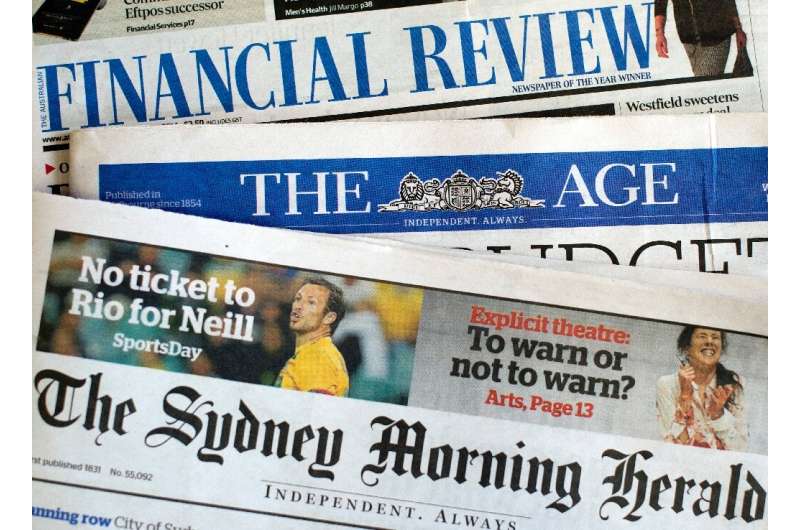Australia unveils law forcing tech giants to pay for news

Australia unveiled a draft law Friday to force Google and Facebook to pay news media for their content or face huge fines in one of the most aggressive moves by any government to curb the power of the US digital giants.
Treasurer Josh Frydenberg announced the "mandatory code of conduct" to govern relations between the struggling news industry and the tech firms after 18 months of negotiations failed to bring the two sides together.
In addition to payment for content, the code covers issues like access to user data and transparency around the algorithms used to rank content in the platforms' news feeds and search results.
"Nothing less than the future of the Australian media landscape is at stake with these changes," Frydenberg said, calling the legislation a "world-leading regulatory framework".
He said legislation implementing the code would be introduced to parliament in the coming weeks after a final round of consultations—and would include "substantial penalties" that could cost the tech companies hundreds of millions of dollars.
While the code could eventually apply to any digital platform, Frydenberg said it would initially focus on Facebook and Google, two of the world's richest and most powerful companies.
Google responded quickly, saying it was "deeply disappointed" with the proposal.

"The government's heavy-handed intervention threatens to impede Australia's digital economy and impacts the services we can deliver to Australians," said Mel Silva, Google's managing director for Australia and New Zealand.
Facebook issued a terse one-line response that hinted it could reconsider its activites in Australia if the proposals were implemented.
"We are reviewing the government's proposal to understand the impact it will have on the industry, our services and our investment in the news ecosystem in Australia," said Will Easton, Facebook's local manager.
The initiative has been closely watched around the globe as news media worldwide have suffered in an increasingly digital economy, where advertising revenue is overwhelmingly captured by Facebook, Google and other big tech firms.
The crisis has been exacerbated by the economic collapse caused by the coronavirus pandemic, with dozens of Australian newspapers closed and hundreds of journalists sacked in recent months.
Unlike other countries' so-far unsuccessful efforts to force the platforms to pay for news, the Australian initiative uses competition law and not copyright regulations to challenge what Australia calls an "acute bargaining power imbalance" between media and the US giants.

'We want it to be fair'
The move has been strongly pushed by Australia's two biggest media companies, Rupert Murdoch's News Corp and Nine Entertainment, who stand to gain the most from the crackdown.
News Corp Australasia executive chairman Michael Miller called Friday's announcement a "watershed moment" and declared the "platforms' days of free-riding are ending".
Frydenberg warned Google and Facebook that any "discrimination" against Australian media as a result of the new law would be considered a punishable breach of the code.
He said the aim was "not to protect Australian news media businesses from competition, or from disruption that's occurring across this sector" but rather "to create a level playing field".
"We want Google and Facebook to continue to provide these services to the Australian community which are so much loved and used by Australians.
"But we want it to be on our terms. We want it to be in accordance with our law. And we want it to be fair."

Under the code, drawn up by the Australian anti-trust watchdog ACCC, tech companies will be required to negotiate with news firms "in good faith" over payments for use of their content.
If agreement cannot be reached within three months, the issue will go to binding arbitration.
Violations of the code will draw penalties of up to Aus$10 million (US$7 million) per breach or 10 percent of the company's local turnover, which the ACCC has estimated at some US$4 billion annually.
Both Facebook and Google say advertising revenue linked to news content is a small fraction of their overall revenue and that they have contributed hundreds of millions of dollars to local news media by driving traffic to their online services, providing grants and purchasing some content.
But ACCC chief Rod Sims said Friday such efforts failed to address the unfair power wielded by the tech titans.
"We wanted a model that would address this bargaining power imbalance and result in fair payment for content, which avoided unproductive and drawn-out negotiations, and wouldn't reduce the availability of Australian news on Google and Facebook," he said.
© 2020 AFP





















